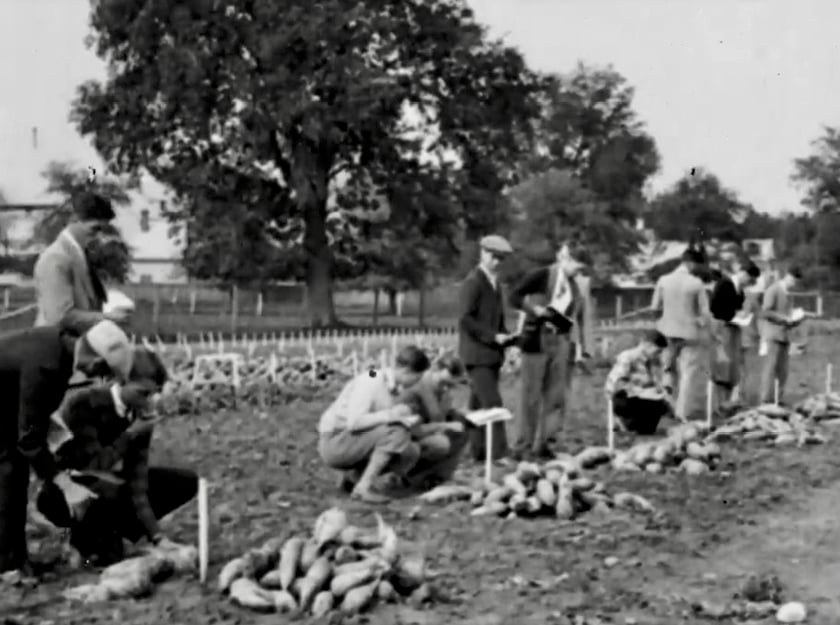‘College on the Hill’ celebrates 150 years

The Ontario Agricultural College (OAC) is celebrating 150 years of history, having first opened its doors in May 1874. Organizers of upcoming events celebrating the 150th anniversary put their promotion into high gear at the end of April, most notably through a YouTube video featuring a well-known alumnus who has been involved with the University of Guelph-based institution for over half of those years.
Read Also


Opinion: A new fight on the artificial intelligence front
At the recent Farm and Food Care Ontario annual meeting in Elora, the focus of afternoon presenters was on artificial…
Clay Switzer, a former OAC dean who first arrived on campus in 1947 to study botany, speaks fondly of his alma mater in a video posted April 30 on the University of Guelph’s OAC YouTube channel. Switzer remarks he has been involved with the college for 76 years.
“I think the 150th is a great time to look ahead, look to the future,” he says. “What does the present administration see for the future? What does the student body see for the future? What do the alumni see for the future?”
That sentiment is echoed in a recent news release from the organizing committee, promising “a range of events, projects and activities” beginning in May and running through the end of the year “that reflect (OAC’s) achievements and vision for the future … As we mark this milestone, we invite you to explore our rich history, connect with fellow OAC community members, and join us in charting a bold course for the future.”
The first big showcase event — a Celebration Dinner and Alumni Weekend — is planned for June 21-23 and alumni are encouraged to book tickets early to avoid missing out.
Farmers and friends of farmers who use social media would have noticed an uptick of OAC nostalgia content at the beginning of May, as alumni began following through on a request from the college to share their memories to help kick off the celebrations. The OAC 150th celebration website already features hundreds of submitted pictures through a link to a Flickr photo-sharing website — a collection that will undoubtedly grow over the coming months.
Founding College
The OAC is one of three founding colleges of the University of Guelph along with the Ontario Veterinary College and Macdonald Institute when the university formed in 1964. The University of Guelph is now home to approximately 3,700 students on campuses in Guelph and Ridgetown.
But when it first opened its doors in 1874 under its original name, the Ontario School of Agriculture and Experimental Farm, it had about 30 pupils.
In the college’s early years, those students were expected to learn not only through instruction but also through hard physical labour. A 1999 book entitled The College on the Hill: A New History of the Ontario Agricultural College, published by Dundurn Press, relates how OAC was modelled in part after land grant colleges in the United States where students were required to contribute as farm labourers.
Authors Alexander M. Ross, Terry Crowley and Terence Allan Crowley tell of a revolt among the 30-member inaugural class against OAC’s first principal, calling for more sustenance to be provided during a steamy early summer haying season. The principal “finally relented,” they wrote, “by ordering a lunch sent to labourers in the fields at 10 a.m., a second repast at 4 p.m., and a third at 9 in the evening before retiring.”
But Ontario Premier Oliver Mowat was apparently not impressed — he asked for and eventually received the principal’s resignation shortly thereafter.
Fifty years later, hard-worn work clothes gave way to collared shirts, ties and blazers. A black-and-white video from Library and Archives Canada, posted in 2021 to the Facebook group Old Ontario Series, looks back at OAC from 1926 to 1929. In the video, young men in what now looks like formal attire kneel on the ground to examine a plot of mangels, lead calves around a ring, or examine the contents of test tubes in a lab.
The 1926-29 video also shows the early days of young women on OAC’s campus — the early students of the Home Economics courses at Macdonald Institute. Young women were also welcomed on campus during the First World War — “farmerette” volunteers who came to help tend the livestock and work the fields.
Change in location
OAC was originally an associate college of the University of Toronto, with U of T granting degrees until the University of Guelph’s formation in 1964. But its 1874 opening in Guelph came only after a previous attempt to open an agricultural college on U of T property along Bloor Street in Toronto. That school “attracted only a handful of students,” the College on the Hill book authors reported, and ceased operation in 1864.
Another aborted plan — scuttled in favour of the Guelph location after Mowat’s Liberals defeated post-Confederation Ontario’s inaugural Conservative government — was for the School of Agriculture and Experimental Farm to be located in Mimico. Overcoming the objections of Mimico-area residents who would have happily welcomed the school, the Liberal-leaning Guelph proponents argued the Mimico site was unacceptable due to “the stiff, hungry, barren clay (soil), the monotonous level of the land, the lack of running water and the proximity to the Humber marshes.”
So the Guelph location prevailed, with administration originally housed in what had been the home of the Stone family of Stone Road fame, who sold the land to the government for the institution’s establishment.
“Throughout its history,” the 150th anniversary news release reflected, “OAC has been a leader in innovation, research and teaching to support the agri-food sector.” Acting dean John Cranfield added, “Today, the influence of OAC extends far beyond agriculture, helping to bolster the backbone of our global agri-food system.”
“OAC is a beacon of support for those dedicated to nurturing the land, sustaining our communities, and safeguarding the environment for future generations,” he said.
Agricultural contributions
The University of Guelph highlighted the following OAC milestones in its release:
- In 1903, the establishment of the Macdonald Institute on the OAC campus marked a significant entry point for women into the community and higher education. At first providing only domestic science education, women at the Macdonald Institute gained greater access to a range of programs and roles in the agricultural sector as societal attitudes shifted.
- Over two world wars, OAC professors taught military leaders who were teaching soldiers how to make efficient use of war rations.
- In 1946, OAC welcomed its first international students from India who enrolled to learn the latest innovations in animal husbandry, beekeeping and soil biology.
- In 1997, OAC began offering programs and conducting research at two locations, as Ridgetown Campus officially became part of the university.
The university said the OAC has championed numerous advancements and influenced Canadian agriculture and global practices over the past 150 years. Here are just a few highlights:
- Yukon Gold potatoes
- Guelph Millennium asparagus
- Omega-3 eggs
- Ice cream course
- Bachelor of Indigenous Environmental Science and Practice
- Canadian Research Institute for Food Safety
- Soils at Guelph
- Controlled Environment Systems Research Facility (CESRF)
- Regional and Rural Broadband (R2B2)
For a full list of planned events and celebrations, visit the OAC 150 website.
Source: Farmtario.com

